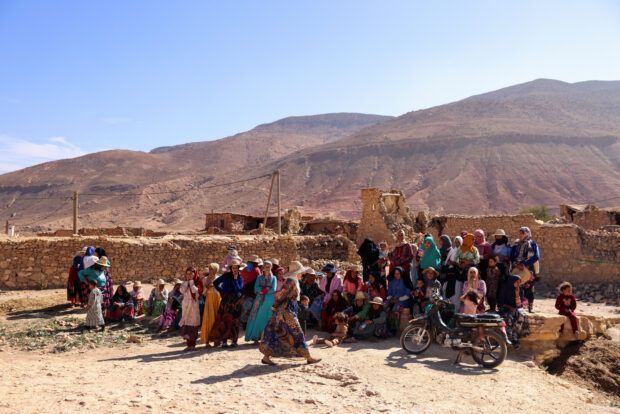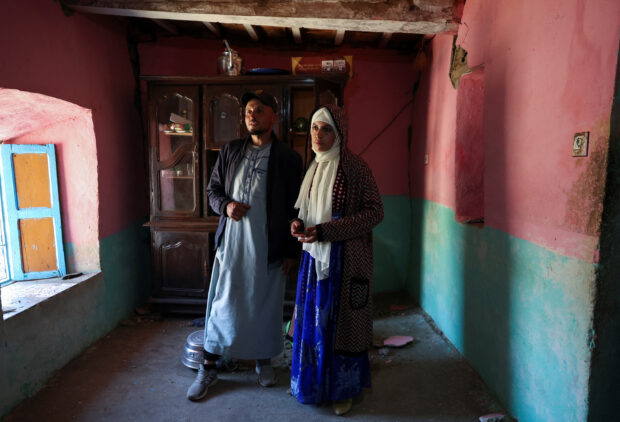Wedding party saved Moroccan villagers from deadly quake
Earthquake survivors wait for aid, in the aftermath of the 6.8 magnitude earthquake, in the village of Ighil Ntalghoumt, Morocco, September 11, 2023. REUTERS
KETTOU, Morocco — A wedding celebration saved all the people of a Moroccan village during Friday’s deadly earthquake, which destroyed their stone and mud-brick houses while they were enjoying traditional music in an outdoor courtyard.
The marriage of Habiba Ajdir, 22, and apple farmer Mohammed Boudad, 30, was due to take place at his village of Kettou on Saturday, but by custom the bride’s family held a party the night before the wedding.
A video filmed by a guest showed the moment the 6.8-magnitude earthquake struck, with images of musicians in traditional clothes playing on flutes and handheld goatskin drums, suddenly giving way to chaos, darkness and screaming.
Standing beside his wife on Tuesday, and still wearing their wedding clothes nearly four days after the quake buried their possessions in rubble, Boudad said the tremor had overwhelmed him with fear for her as he waited in his own village
“We wanted to celebrate. Then the quake hit. I didn’t know whether to worry about her village or mine,” he said.
As he spoke, Boudad held his wife’s hand. He smiled shyly when asked how they had met, saying only that they were “brought together by fate”. Ajdir was so traumatised by the earthquake she did not want to speak to strangers, he said.
Her impoverished village of Ighil Ntalghoumt was left in ruins, and many of its people are now homeless, but unlike in other parts of the Adassil region, close to the tremor’s epicentre, there were no deaths or serious injuries, residents said.
The earthquake was Morocco’s deadliest since 1960, killing more than 2,900 people, mostly in remote settlements in the High Atlas mountain range south of Marrakech.
Fears
Groom Mohammed Boudad stands with his wife, Habiba Ajdir, inside their house that was damaged in the aftermath of the 6.8 magnitude earthquake, in Kettou village, Morocco September 12, 2023. REUTERS
On the video, people scream and shout “earthquake”, or call for family members as the overhead electric lighting from the music and dance is replaced by pinpoints of flashlights from mobile phones.
Only one person in Ighil Ntalghoumt, eight-year-old Ahmed Ait Ali Oubella, was injured in the quake when a rock fell on his head, cutting it open, and he can be seen in the video being carried to safety by his father.
The party was a traditional pre-wedding celebration thrown by the family of the bride before she was to depart the next day for the house of the groom, Boudad, waiting in Kettou.
Despite the disaster, she travelled to Kettou on Saturday with Boudad’s brother and his wife, who had been at the party, leaving behind her marriage gifts and arriving in the afternoon.
The roads were so bad they had to walk the whole way and when they arrived they found widespread damage but no deaths.
As in Ighil Ntalghoumt, a communal event had saved many lives, with villagers commemorating a funeral in a house that stayed upright. Boudad had bought 150 chickens and 30kg (66 pounds) of fruit to celebrate the wedding that afternoon but much of it has now rotted.
“When she arrived there was nowhere to sleep. We are just looking for a tent,” he said.
Escape
Many people from villages around Ighil Ntalghoumt had also come to enjoy the Ajdir family’s celebration and a shared meal of beef tagine stew, meaning they too escaped being trapped in their homes by falling rubble.
The bride’s father Mohamed Ajdir, 54, had set up a big tent in the courtyard of his house for wedding guests to enjoy the party. That tent is now being used as shelter for the villagers, though they say they need more robust shelters soon, with colder, wetter weather expected later this week.
As he walked around the village, Ajdir pointed to signs of Friday night’s chaos, with dainty dress shoes abandoned in the rubble.
The terrible fate the people of Ighil Ntalghoumt escaped was clearly visible a few kilometres back down the winding mountain road towards Marrakech where the village of Tikekhte was almost entirely wiped out.
Not a house was left standing and some 68 people perished out of the village’s 400 inhabitants.
But while the people of Ighil Ntalghoumt were saved, they were still in dire need of help and some of them could be seen walking down the mountain to ask the authorities for aid.
In Kettou, all the survivors were now sharing their meagre supplies. “The village is a big family. We share all we get,” he said.
















